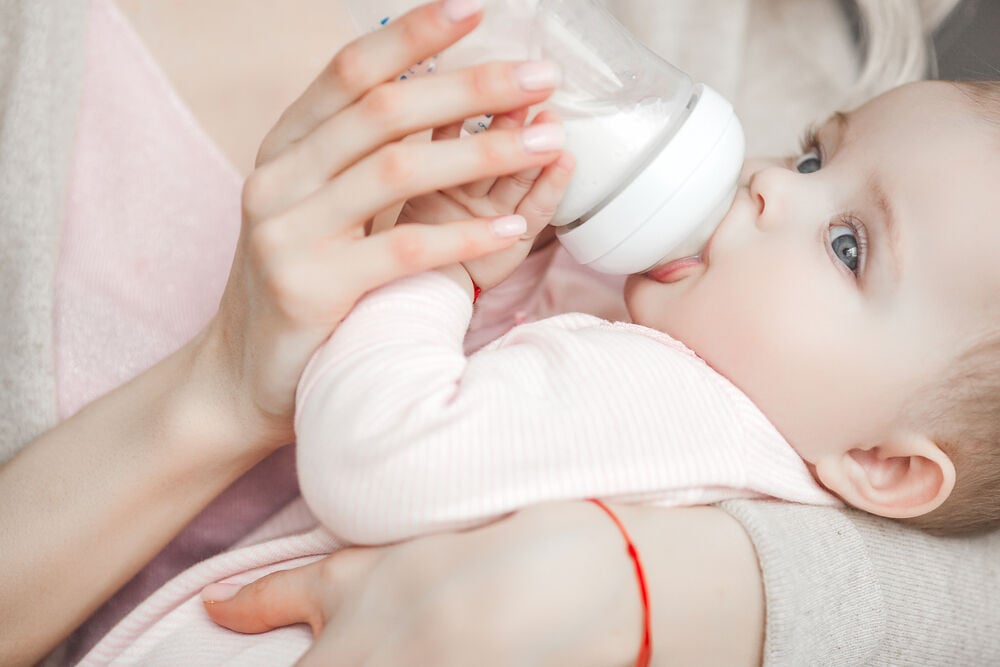Many new parents want to know when it’s time to wean their baby off formula and introduce solid foods. What’s the best way to go about it? Learn the healthiest approaches to this transition.
-
Tracking cycle
-
Getting pregnant
-
Pregnancy
-
Help Center
-
Flo for Partners
-
Anonymous Mode
-
Flo app reviews
-
Flo Premium New
-
Secret Chats New
-
Symptom Checker New
-
Your cycle
-
Health 360°
-
Getting pregnant
-
Pregnancy
-
Being a mom
-
LGBTQ+
-
Quizzes
-
Ovulation calculator
-
hCG calculator
-
Pregnancy test calculator
-
Menstrual cycle calculator
-
Period calculator
-
Implantation calculator
-
Pregnancy weeks to months calculator
-
Pregnancy due date calculator
-
IVF and FET due date calculator
-
Due date calculator by ultrasound
-
Medical Affairs
-
Science & Research
-
Pass It On Project New
-
Privacy Portal
-
Press Center
-
Flo Accuracy
-
Careers
-
Contact Us
When Do Babies Stop Drinking Formula? Timely Tips for Weaning

Every piece of content at Flo Health adheres to the highest editorial standards for language, style, and medical accuracy. To learn what we do to deliver the best health and lifestyle insights to you, check out our content review principles.
What does weaning mean?
New parents may not be familiar with the term “weaning.” Whether babies are breastfed or bottle fed, weaning is a process every baby must go through. It’s the practice of replacing breast milk or formula with healthy solid foods and drinks.
When to stop using formula
What are the signs that a baby is ready to give up formula? Every baby is different. While some become less interested in bottle feeding by the age of one, others may want to continue bottle feeding until much later.
There are ways to make this process as stress free as possible for everyone concerned. Next, we’ll discuss best practices for weaning.
How to wean babies off formula

Take a quiz
Find out what you can do with our Health Assistant
Weaning can be a challenge, and it’s normal to feel nervous. Here are some tips to make the process go smoothly:
- Allowing for plenty of time and practicing patience are key, as babies may struggle with or resist these changes.
- A baby’s first birthday can be a good starting point. At this point, they’ve likely developed enough to be eating solid foods and drinking water from a cup. Monitoring babies’ attitude toward formula and/or breast milk can help determine if they’re ready for weaning.
- Parents can stop bottle feeding suddenly or opt to gradually substitute bottle feeding with solid foods and other beverages. Babies’ signs of readiness include better hand-to-mouth coordination, decreased tongue protrusion reflex, sitting up unassisted, and opening their mouth for the spoon. Avoid choking hazards such as small fruits, raw vegetables, nuts, candy, gum, and whole grapes.
- To wean a baby gradually, try eliminating bottles one at a time. Instead of three a day, skip their morning bottle and offer a serving of healthy baby food instead. After a couple of weeks, eliminate the second bottle feeding, and so on.
- If a child is getting curious about their surroundings, it’s another strong indication they might be open to trying new foods.
- Instead of automatically providing a bottle when a baby is fussy, assess their specific needs. Begin serving small amounts of water in sippy cups and incorporating fruits and veggies. It takes time and effort to help them adopt a healthy diet.
- Visually enticing babies with fun, colorful, interactive foods at mealtime can help them be more interested in trying new things.
What drinks are appropriate after weaning a baby off formula?

One-year-olds who are eating a well-balanced diet of solid foods can drink whole cow’s milk, fruit juices, and smoothies. Smoothies can be a tasty way to incorporate vitamins and minerals for healthy development. Whenever possible, opt for low- or reduced-sugar options. Babies should have no more than 1 quart (about 32–36 ounces) of whole cow milk and up to 4 ounces of 100% fruit juice per day.
The transition from bottle or breastfeeding to solid foods and beverages is a significant milestone in babies’ lives. Making healthy choices for their diet now is a good way to ensure their healthy development over the long term. And when in doubt, don’t hesitate to consult a pediatrician or other health care provider.


Hey, I'm Anique
I started using Flo app to track my period and ovulation because we wanted to have a baby.


The Flo app helped me learn about my body and spot ovulation signs during our conception journey.


I vividly
remember the day
that we switched
Flo into
Pregnancy Mode — it was
such a special
moment.
Real stories, real results
Learn how the Flo app became an amazing cheerleader for us on our conception journey.




